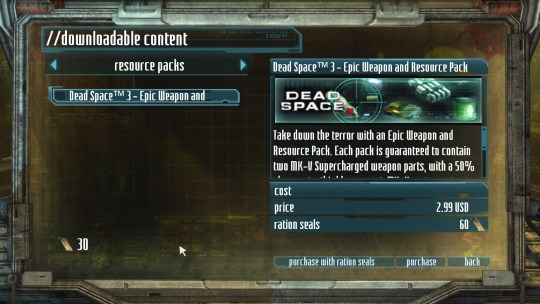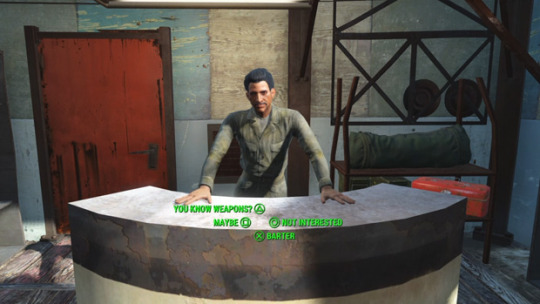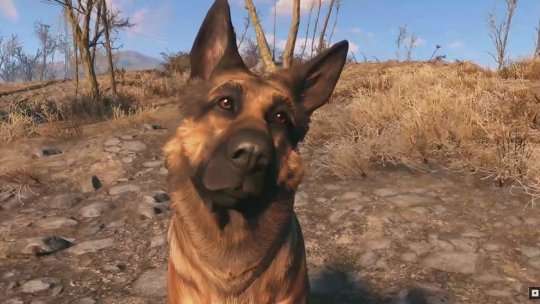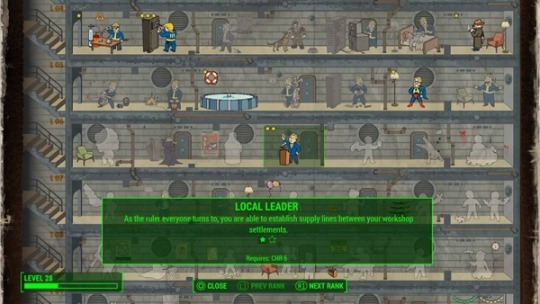
Featured Blog | This community-written post highlights the best of what the game industry has to offer. Read more like it on the Game Developer Blogs or learn how to Submit Your Own Blog Post
5 Changes For A Fallout 4 Without Fast-Travel
If Fallout 4 was designed around the assumption that fast-travel is there, what would we have to change in order to remove it? What would we want to change?

There has been some really good essays, posts, and think-pieces about why we might want to get rid of fast-travel, or at the very least why we might not want to include it in every game as though it were some natural good without consequence. I largely agree, there are a lot of games would benefit from removing fast-travel.
It is easy to forget but removing mechanics can be just as powerful, if not more so, then adding them. For example Dark/Demon's Souls and Dead Space are better because they removed the ability to pause the game. The game even continues when you do inventory management. Removing this convenience creates a constant, inescapable tension that is perfect for these games. Is it a good idea for every game? Of course not. My point here is we have this tendency to think of these in game conveniences as though they are absolute goods, but they are really choices that have both costs and benefits.
The problem with playing a game like Fallout 4 without fast-travel is that the game was designed around the idea that the player has fast-travel and would use it all the time. Many of the choices the designers were making leaned on the idea that fast-travel was there for the player. Certain problems with the game could be ignored without cost because the player could easily fast-travel, or rather, they weren’t problems because of fast-travel.
This is why arguments like "If you don't like it don't use it" fall flat for me here, because this isn't a feature that exists in a vacuum. I can think that it is silly that I need to own my own car, but I can't just get rid of it on principle because the public transportation where I live is crap. It is crap because everyone is expected to have their own car. I might want to be able to sell my car but that preference doesn’t exist in a vacuum, it exists within the reality of my surroundings that prevents it from being a viable alternative. You can't ignore something whose existence helps define and shape every other part of the system you are operating in.

This is also why the arguments that paid elements in games are inherently harmless because you can “just ignore them” are poorly thought-out. They aren't there on accident, the game wasn't designed independently of them, the game was designed to encourage you to want/need them. The game is both creating the need and charging for the solution. Whether or not this practice is inescapably exploitative is another discussion, but to say you can just ignore it is, at best, hopelessly naive.
What I really want to talk about though is this: if Fallout 4 was designed around the assumption that fast-travel is there, what would we have to change in order to remove it? What would we want to change?
1) The world isn't a dungeon anymore
The overworld of Fallout 4 is designed like a large dungeon, this makes sense given the assumption that you are only going to each place on foot once. Enemies are scattered around the overworld, and places within it, to ensure that getting to a place first requires the player to face X amount of challenges. As though getting to a place is a mini-dungeon, with reward for completion being permanent fast-travel access to that place.
Without fast-travel though, the difficulty and number of enemies you encounter getting to a place doesn't have to be artificially high as it doesn't come with that reward of a fast-travel unlock. Getting to a place doesn't mean you've unlocked anything, it just means you are at a place. You aren't traveling to unlock new places to fast-travel to, you are just going places. With that in mind, overworld design should take a more naturalistic approach to enemy placement and density.
The game already does take a naturalistic approach, but it should be hugely amplified to work for a game without fast-travel. For instance roads, especially main roads, should be relatively safe from random monster attacks. There might be a threat of a bandit attack or a robbery while on main roads, but wouldn't have to be the obstacle course it is now. Getting to places that are central and populous (such as cities) should be relatively easy to do (though perhaps time consuming).
Remember, these are the roads that normal-ish people are supposedly also using. True, there isn't a central government to protect all of the roads (though apparently a lot of groups vying for job), but there are city and town governments that do want trade and so would keep trade routes around them safe-ish. On the other hand, the non-roads would be much more dangerous. The advantage of going off-road is shortcuts and the risk is monsters.
I'm not saying travel shouldn't be dangerous in Fallout 4. I'm saying that there are clear design differences between a dungeon that has a new area as a reward and a normal route of travel that you might get attacked on. How people experience the space between towns and cities changes when players can't wish themselves between them, and the world design needs to change to accommodate that.
2) Arbitrage!
Arbitrage is the fanciest way of saying "buying low in one place, selling high in another." Buy screws for 7 in Sanctuary, sell them for 20 Diamond City, enjoy the profit. The concept of trade isn't really explored in Fallout 4, the reason for that is largely because of fast-travel.
You can't have different markets of people who value things differently that the player can exploit to make money off of because travel is both free and instant. Completely buy out one vendor and you're only 1 loading screen away from their counterpart on the other side of the map. If travel wasn't free and instant though you could make different places value things at vastly different levels and let the player profit off of those differences without it being the infinite source of free money it would be with fast-travel.

I'm at Sanctuary and I have to get to Goodneighbor for a quest. Is it worth taking a detour to Diamond City which tends to buy them for more, or should I just go straight to Goodneighbor and sell them there? What other shops are on the way, what do they want?
The value of this goes beyond creating a way of generating money for the player. It creates personality for each place, and gives it a more concrete identity for the player. With this, they don’t want to just head to the nearest shop, they also want to think about which shop they would get the best deal at. Drumlin Diner as that place you can always unload circuitry for tons of money. Bunker Hill pays shit for water but always pays top dollar for guns, and Goodneighbor as the best place to get screws (and screwed).
Instead, every vendor values everything at the exact same rate. Who is the best person to sell this item to? The closest. Who is the best person to buy that item from? Whoever has it.
3) Questing
With the removal of fast-travel we can no longer assume a player can just instantly be somewhere. That isn't a shocking statement, but it is worth thinking about how that impacts quest design. The classic setup of a quest is 1)Talk to a person, 2)Go do something for them, 3)Return and tell them that you did the thing.
Remembering that a player no longer can just instantly be where you want them to be, how can we make this whole process less cumbersome, or at least involve less back and forth (which we should probably get rid of anyways)?
First, why does the player have to keep going back to the quest giver to report progress and then finally completion? I mean, the player does have a radio strapped to their arm. I know that radio tech in the Fallout universe isn't perfect but it is a a work of fiction and the technology is clearly possible. Fallout 4 could just say that radio tech in Boston is much better then it was in the areas the previous games covered. The series isn't so devoted to the purity of its lore that it is above throwing in these kinds of things for convenience.
You could use the radio to get quests (you already can, but only for a couple procedurally generated ones), move quests forward (instead of always having a face-to-face), or even completing quests. How you would get the reward for completion might need a bit of hoop-jumping if done over the radio but they can just mail it to you and can you pick it up later.
There is no need for the endless and repetitive back and forth of going into town to get a mission, going into the field to complete the mission, going back into town to talk to them again to complete the mission, only to get a new mission from them and then go back into the field again. A 2-way radio could streamline the questing process that gives the player more time doing and less time traveling. The back and forth is annoying even when you can simply teleport all over the place, but when you actually have to hoof it back and forth, it sucks.

The radio could also be used to call up companions. The game already has a problem where it is very easy to lose track of where they are. You could just call them up, ask them to come and they will arrive a couple of hours of game time later. Dogmeat, might not be able to have his own radio, but just have someone watch him and use it for him, letting him bark into the radio. That would be adorable. I would radio Dogmeat all the time just to talk to him.
4) What time is it?
The most obvious change removing fast-travel has is how it changes the player's relationship with space, but it also vastly changes their relationship with time. Not just because now doing certain things takes longer, but in terms of how they experience the game's clock. It is easy to forget but when you fast-travel Fallout 4′s clock jumps ahead based on how long it thinks it would take you to walk there. Fast-travel a large distance and it could suddenly become night, or day, or tomorrow.
This means that time often passes without the player actually feeling its passage. That, coupled with the fact that you will be spending a lot of time underground and away from the sun means it is very easy to have no idea how much time the game thinks has passed since you accepted a quest or talked to someone. You might of only talked to someone 5 minutes ago but if within those 5 minutes if you fast-traveled to the other side of the map and back then the game might consider it to be days later.
The fact that the mechanics naturally cause the player to become so disconnected from the in game time is why I'm confused as to why they included timed quests. They are very rare, but they exist. When an character says this “needs to be handled within the next couple of days” that sounds fair, but players’s won’t actually have a feel for how long that is. That could either be a ton of time, or incredibly urgent. The player has no idea how much time passes when they fast-travel. There are Fallout 4 message boards filled with people who failed timed quests because they had no idea how much time had passed because player’s only have a very loose connection to in game time.
If though, a player isn't zipping around in time and space then they will have a good feel for the game's clock and they can then accurately balance what must be dealt with now and what can wait. A better connection to the passage of time means you could even add in more time based quests. Not just quantity either, but more variety too. Get this letter to person X before tomorrow, the faster you turn on the power the more money you get, how many super mutants can you kill in the next 30 minutes...
5) Home is where all my stuff is
Again, without fast-travel the player can't just be at a specific place whenever they want to be. This is a problem for storage because you no longer can have a single home base full of the stuff you don't want to carry around anymore. Going back to a single place to store all your stuff would be wildly inconvenient regardless of where that place is.
We could just let the player store stuff wherever and expect them to remember where everything is (maybe add in a note/tagging system for the map that the game already needs). It would be hugely inconvenient for them and make it basically impossible to find something again once you forgot where you put it, but we could. That might be good for a game that is more about survival and scraping by, but Fallout 4 is so collectible/loot centric that expecting the player to accept losing stuff is not going to go over well so let’s keep trying.
The next logical solution is to give them a global system of chests that share an inventory. That might work, but it is a weird mechanic that doesn't mesh well with the more grounded approach to space that is created by our removal of fast-travel. The distance between places is supposed to mean things now, and then we just undermine that by showing that no, distance only matters to you. It would make the removal of player fast-travel seem petty when items get to retain their ability to teleport. While it might mechanically serviceable, the tone of the mechanic is bad.

You can already create a global system of linked inventories in Fallout 4 using the level 1 Local Leader perk in order to create supply lines between all the settlements. It is fine in Fallout 4 with fast-travel because with fast-travel the space between two points already feels arbitrary, so the mechanic is tonally consistent. It is only without fast-travel, when distances seem so large and daunting, that this mechanic feels tonally inconsistent.
Another option would be to give the player a mobile home base for storage. A cart or a supply wagon that vaguely follows them around but sticks to roads, towns, and what-not's. I like the idea of it following you around, or of you sending it places via radio/pip-boy more than you actually having to drive it places. If you had to move it yourself it would be a huge chore. The player would resent having to drag it along behind them everywhere they went. So, give them both a cart and a driver, and have it follow them around like a big lost puppy.
In Fallout 4 it introduced you to a husband and wife and immediately (SPOILERS) killed the one you weren't. What if instead, the other person doesn't die but instead manages the wagon? If we want to keep the player a blank slate for romance options we could make them brother and sister instead, and do a bit of what Assassin's Creed: Syndicate is doing and let you switch between the two, with whichever one you aren't using tending the cart.
We could even combine the cart idea with the arbitrage (from #2) and make it so that you can send the cart to various towns/shops and have it buy/sell stuff. The cost to the player for doing this would be that they lose easy access to it for a while. Hell, add in the risk of the cart being hijacked by bandits forcing the player to have to go rescue your counterpart and get your stuff back from bandits. The player could upgrade their cart for less of a chance of getting robbed, faster travel speed, larger carrying capacity, and so on.
If you do let the cart trade on its own you would also have to completely remove the Wait and Sleep features from the game in order to avoid more arbitrage based get-rich-quick schemes. We were already on course to remove such a feature in order to create a more consistent player relationship with time (see #4), this is just another reason to do so.
Fallout 4 is a big game, and there are a lot of reasons to love it. What makes the game great isn't that it does any one thing perfectly, but that it does so much. That means that everyone who loves it probably doesn’t love it for the same reasons. Any changes that might enhance one aspect of the game that you love might be adversely effecting the reasons others love it. I’m very aware of that.
Even if you did like the mechanics brought about by these changes, that still doesn't mean you would have to like it in a Fallout game. Tetris 2 could be the most brilliant FPS game in a generation and I would still look at it sideways.
My point here is less about the direction I think the Fallout series should take and more about exploring what could be changed to focus on different aspects of the series identity. Some might like these changes because it pushes the game more towards survivalism, while some won't like it because they really like the world building mechanics the game has and want more of that from the series. A lot of these things are taste, and taste can be subjective.
What about the game did you enjoy the most? What would you change?
Read more about:
Featured BlogsAbout the Author(s)
You May Also Like







.jpeg?width=700&auto=webp&quality=80&disable=upscale)








